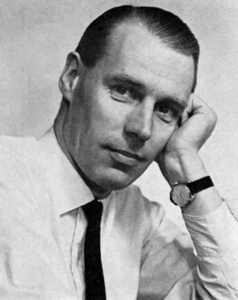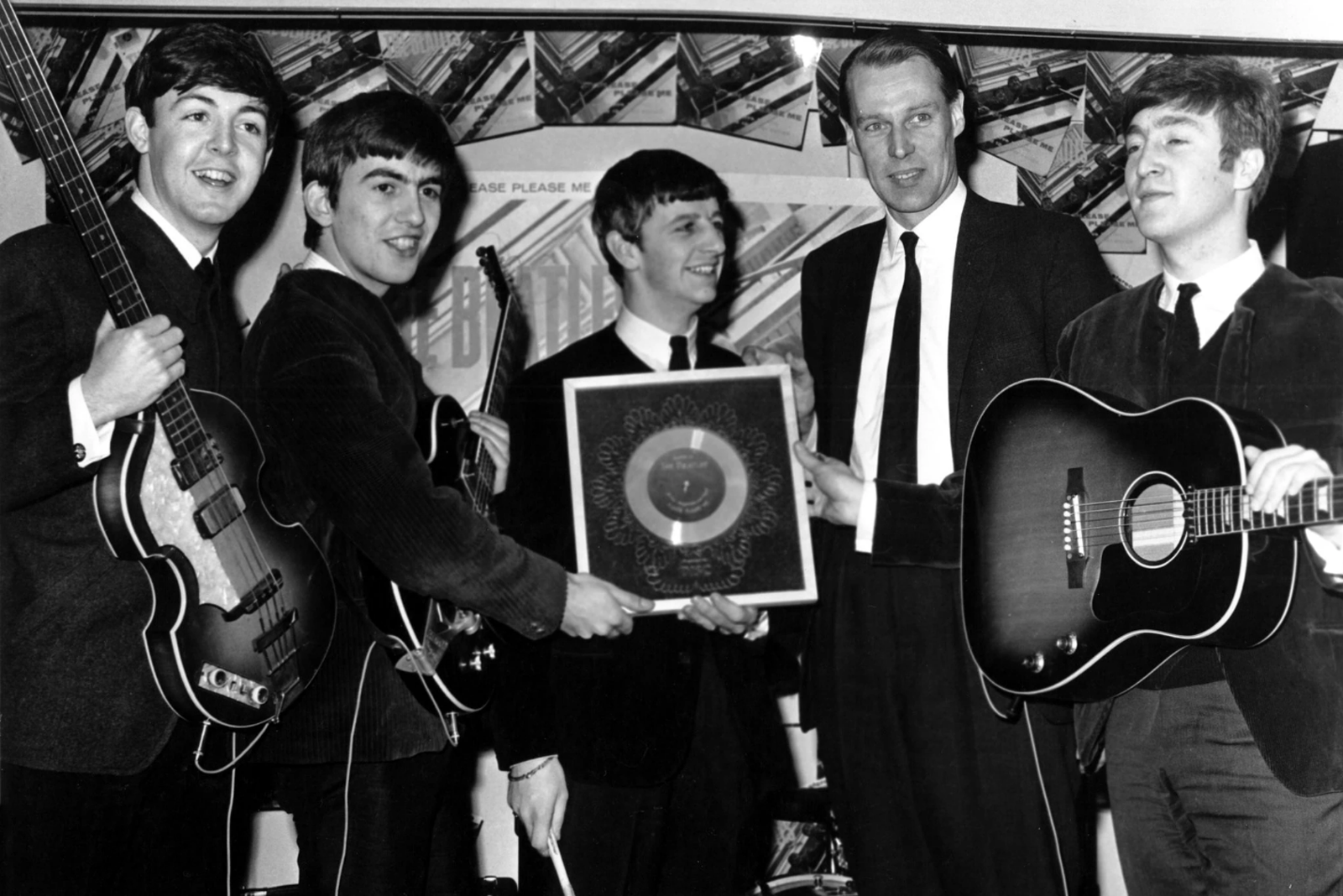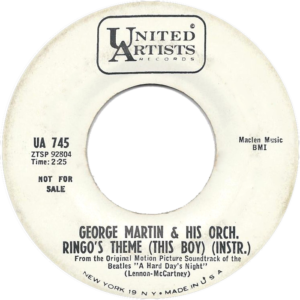 George Martin, Who Records Beatles for Parlophone, Now Has a Big Hit in His Own Right
George Martin, Who Records Beatles for Parlophone, Now Has a Big Hit in His Own Right

MUSIC BUSINESS — September 26, 1964 — His life changed. George Martin is a man whose entire life has been changed by the Beatles. This tall, lean, and quiet-spoken Englishman is the man who signed the Beatles–when they were very unknown–to a contract with EMI, the English record manufacturing giant. He is the man who records all of the Beatles sides for Parlophone (the boys’ English label) and the man who scored the soundtrack for their hit movie “A Hard Day’s Night.”
George signed the Beatles after they were turned down by a number of other labels. He has been with them ever since. He was in the United States to supervise their live recording at the Hollywood Bowl two weeks ago.
In his own right. “The boys have done a lot for me,” mused Martin during a lunch with Music Business editors. “They have helped me fulfill my desire to arrange and conduct in my own right.” His own right happens to be a very good right, by the way, because the George Martin recording of “Ringo’s Theme” from the picture soundtrack on the United Artists label in the U.S., has already sold over 200,000 recordings. And his LP, called “Off The Beatles Track” is also a big one for United Artists Records.
Before the Beatles ever came on the scene George Martin had already established himself as a top recording man in London. Some of the artists he records for EMI include Billy J. Kramer, Gerry and the Pacemakers, Cilla Black, The Hollies, Matt Monro, Shirley Bassey, Ron Goodwin, Peter Sellers, Rolf Harris, and many others. The artists whose records he supervises comes to 48 in all.
Also a composer. Martin is also a composer of note in his native England. One of his biggest songs here was called “The Niagara Theme,” and he has written many other songs, that so far have been bigger hits there than here.

A thumbnail description of a Beatles recording session, according to Martin, would go like this. The Beatles come in with a new song, written 99 per cent of the time by John Lennon and Paul McCartney. John and Paul sing the song through (none of the Beatles can read or write music) until Martin learns it, and then he sits down at the piano and plays it. Then the boys and Martin work out an arrangement together, with each coming through with ideas. It usually takes about three or four hours to work out the arrangement on each song. After that they are ready to record.
Let him run. Martin has been asked by many people whether he ever intends to put strings behind the boys, or record them with a full orchestra, or with choral backing or whatever. “I don’t intend to change anything they do,” says Martin emphatically. Recording a successful artist is like riding a good horse. The best way is to let him run. All you should provide is a good balance. “The balance that Martin provides for his artists apparently is a very good one. To illustrate this it has been estimated that the records George Martin has produced with his artists have sold over 100 million copies throughout the world. Last year–1963–recordings produced by Martin were in the No. 1 spot on the English charts 37 weeks out of 52. For 17 consecutive weeks recordings he produced for Parlophone were No. 1.
What did it. What made the Beatles take off the way they did in the U.S., Martin was asked, and would American record artists move back into the top rungs throughout the world soon or not? “There was a vacuum to be filled in the pop record business, and the Beatles filled it,” said Martin. “As for the American recordings, I think there has been a great awakening here since last Winter, and many of the new American records are getting right up there. “Among the recording men whom Martin respects very highly here are Bert Bacharach and Hal David, who produce all of the Dionne Warwick recordings. “They have brought fresh, new ideas into the recording world,” says Martin.
Breaking the hits. How does a record company break a new recording in Britain, since there is so little radio time allotted for pop records, Martin was asked. “We break our records via TV, which covers the entire country, not by radio,” said Martin. “There are TV shows like ‘Thank Your Lucky Stars’ and ‘Ready, Steady, Go,’ that put a record over very quickly. Sales of records in Britain are up very much today, according to Martin, with a sale of 800,000 average for a No. 1 recording. (The Beatles, of course, do much better.)
 United Artists records is on a big campaign in the U.S. to build George Martin into a recording star, and they are on their way with “Ringo’s Theme.” What kind of recording does Martin want to do in the future? “I’m not certain yet, I know I would like to record many of my own songs for release here, and then I have a number of other ideas. I don’t intend to try to copy anyone’s style, but to create my own. That’s why I recorded all of the Beatles songs in my own way, rather than to use the same arrangements the boys do when they sing them. You know, Paul and John write very good songs.” Sales of Martin’s recordings indicate many other people feel they do too. END
United Artists records is on a big campaign in the U.S. to build George Martin into a recording star, and they are on their way with “Ringo’s Theme.” What kind of recording does Martin want to do in the future? “I’m not certain yet, I know I would like to record many of my own songs for release here, and then I have a number of other ideas. I don’t intend to try to copy anyone’s style, but to create my own. That’s why I recorded all of the Beatles songs in my own way, rather than to use the same arrangements the boys do when they sing them. You know, Paul and John write very good songs.” Sales of Martin’s recordings indicate many other people feel they do too. END
_______________
Information, credit and news source: Music Business; September 26, 1964
![]()
